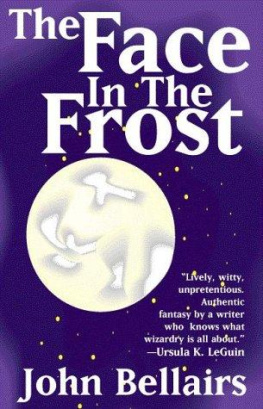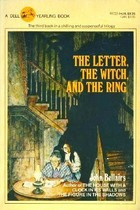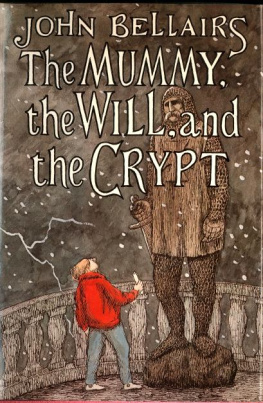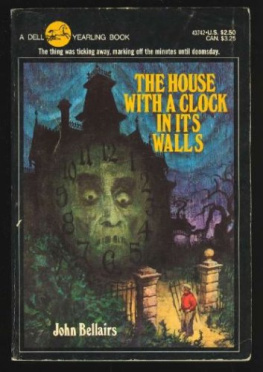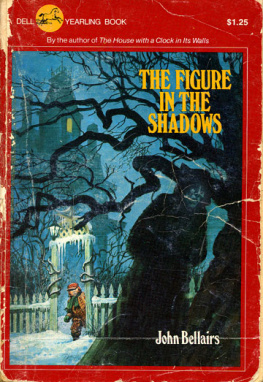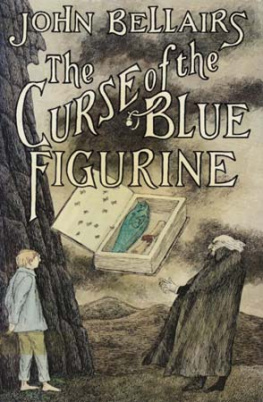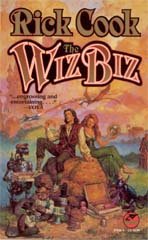THE FACE IN THE FROST
by JOHN BELLAIRS (1969)
(version 1.0)
To the Memory of my Mother
PROLOGUE
Prospero and Roger Bacon, the two main characters in a story that seems crammed with wizards, were wizards. They knew seven different runic alphabets, could sing the Dies Irae all the way through to the end, and knew what a Hand of Glory was. Though they could not make the moon eclipse, they could do some very striking lightning effects and make it look as though it might rain if you waited long enough.
The two large domains mentioned in this tale were always known simply as the North Kingdom and the South Kingdom. No attempt was ever made to unite them, and the Brown River always remained the boundary. Even the maintenance and garrisoning of the two great circular forts at the mouth of the river had to be split rigidly between the kingdoms Northerners guarded the northern fort, Southerners the southern one though the forts had only one purpose to keep out invaders from across the sea. The North Kingdom was split, very early in its history, into seven lesser kingdoms, whose kings met once a year on the Feasting Hill, which was in the center of a small, roughly circular plot of ground that touched all their borders, though it did not belong to any one ruler. At this harvest festival the High King was elected: he was usually one of the seven kings, but this was not necessary; his term was one year, and could be extended in case of war. He was given a standing army of ten thousand horsemen, but he would have been powerless without the consent of the heptarchs, as the seven lesser kings were known, since any two of them could field an army greater than his. Besides, the High King was forced to leave his own domain in the hands of a temporary ruler (usually his chief steward, who became for the time a heptarch) and reign at the beautiful, but defenseless, palace on the Feasting Hill. His army was solely for use in defending the borders and rarely for waging war against a rebellious Northern king. In the latter case, a council of war would be called and the kings would decide whether the situation was grave enough to require action against one of their own number. Civil war was rare, but when it did come the devastation was so great that it took generations for the North to recover.
The history of the South Kingdom was stranger and much more chaotic. If you looked at a map of the South made in Prospero's time, you would think it was a badly done and rather fussy abstract painting, or the palette of a demented artist. You would see blotches within splotches within wavy circles; you would see shapes like ladyfingers, like stars, like dumbbells, and like creeping dry rot. All this was the fault of Godwin I (Longbeard), the first King of All the South, and the last to hold any real power. He divided up the kingdom among his sons, and they did likewise, and so on. Primogeniture was never established, so eventually the South became an indescribable conglomeration of duchies, earldoms, free cities, minor kingdoms, independent bishoprics, and counties. These little worlds were often the size of small farms, though they might be named the Grand Union of the Five Counties, or the Duchy of Irontree-Dragonrock. Each of these petty potentates coined his own money and levied troops; all were vaguely obligated to the King of All the South, a powerless ruler who got the title by beating all opponents at the annual tournament held in Roundcourt, the chief city of the South. Seldom could a chieftain gather enough support for anything the size of a civil war, but there was constant feuding, bickering, and bullying.
Prospero lived in the South Kingdom and never, as far as I know, held public office. He stayed at home a great deal, and his trips to other places in the North and South were made on odd occasions and (sometimes) by still odder modes of travel. The route might be wildly irregular, because he wanted to see friends or visit curious things, like plague fountains, or rocks that made funny noises in the wind. This accounts for the fact that he knew more about some places far up north than he knew about places ten miles from his home. Roger Bacon, who spent most of his time in England, was more familiar with the border country between the North and the South than Prospero was. Both of them had used mirrors to visit or look at other times and places; this naturally affected their speech, their mannerisms, and (God knows) the character of Prospero's house.
ONE
Several centuries (or so) ago, in a country whose name doesn't matter, there was a tall, skinny, straggly-bearded old wizard named Prospero, and not the one you are thinking of, either. He lived in a huge, ridiculous, doodad-covered, trash-filled two-story horror of a house that stumbled, staggered, and dribbled right up to the edge of a great shadowy forest of elms and oaks and maples. It was a house whose gutter spouts were worked into the shape of whistling sphinxes and screaming bearded faces; a house whose white wooden porch was decorated with carved bears, monkeys, toads, and fat women in togas holding sheaves of grain; a house whose steep gray-slate roof was capped with a glass-enclosed, twisty-copper-columned observatory. On the artichoke dome of the observatory was a weather vane shaped like a dancing hippopotamus; as the wind changed, it blew through the nostrils of the hippo's hollow head, making a whiny snarfling sound that fortunately could not be heard unless you were up on the roof fixing slates.
Inside the house were such things as trouble antique dealers' dreams: a brass St. Bernard with a clock in its side, and a red tongue that went in and out with the ticks as the tail wagged; a five-foot iron statue of a tastefully draped lady playing a violin (the statue was labeled "Inspiration"); mahogany chests covered with leering cherub faces and tiger mouths that bit you if you put your finger in the wrong place; a cherrywood bedstead with a bassoon carved into one of the fat headposts, so that it could be played as you lay in bed and meditated; and much more junk; and deep closets crammed with things that peered out of the darkness off the edges of shelves, frightening the wits out of the wizard as he poked around looking for jars of mandrake root or dwarf hair in aspic. In the long, high living room heated by a wide-mouthed green-stone fireplace were the usual paraphernalia of a practicing wizard: alembics, spiraling copper coils, alcohol lamps all burping, sputtering, and glurping as red, blue, purple, and green liquids boiled, dripped, or just slurched uncertainly in their containers. On a shelf over the experiment table was the inevitable skull, which the wizard put there to remind him of death, though it usually reminded him that he needed to go to the dentist. One wall of the room was lined with bookshelves, and on them you could find titles such as Six Centuries of English Spells, Nameless Horrors and What to Do About Them, An Answer for Night-Hags, and, of course, the dreaded Krankenhammer of Stefan Schimpf, the mad cobbler of Mainz.
The four long casement windows on the east wall of the living room opened onto Prospero's forest-bordered garden, an unpruned tangle of forsythia, rose, and lilac bushes split up by a few matted green paths. In the middle of the garden was a small clearing with stone benches and wicker lawn chairs; this park had a fountain, in the center of which a potbellied marble satyr stared mindlessly into an empty cup, as water gushed out of his ears. On summer mornings, Prospero would often sit in this weedy jungle, memorizing spells and watching the birds as they circled in confusion around the gables, pinnacles, and gargoyles that stared out in all directions from his improbable home.
But on a hot, oppressive morning one August, Prospero stayed in bed till almost noon. He was not playing the bassoon, but he

